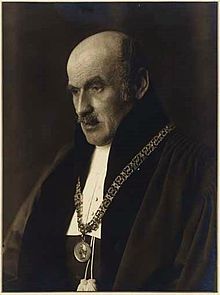Karl Vossler (6 September 1872 – 19 September 1949) was a German linguist and scholar, and a leading romance philologist.[1] Vossler was known for his interest in Italian thought, and as a follower of Benedetto Croce. He declared his support of the German military by signing the Manifesto of the Ninety-Three in 1914. However, he opposed the Nazi government, and supported many Jewish intellectuals at that time.
Karl Vossler | |
|---|---|
 Karl Vossler (1926) | |
| Born | 6 September 1872 |
| Died | 19 September 1949 (aged 77) |
| Alma mater | Heidelberg University (PhD) |
| Occupation | Romanist |
In 1897 he received his doctorate from the University of Heidelberg, and in 1909 was named a professor of Romance studies at the University of Würzburg. From 1911 onward, he taught classes at the University of Munich.[2]
Works by Vossler published in English
edit- "Mediaeval culture; an introduction to Dante and his times"; translated by William Cranston Lawton (1929).
- "The spirit of language in civilization"; translated by Oscar Oeser (1932).
- "Jean Racine"; translated by Isabel and Florence McHugh (1972).[3]
See also
editNotes
edit- ^ Darko Suvin called him The leading Romanist of pre-Nazi times[1]
- ^ Thibaut - Zycha / edited by Walther Killy Dictionary of German Biography
- ^ HathiTrust Digital Library (published works)
External links
edit- Newspaper clippings about Karl Vossler in the 20th Century Press Archives of the ZBW
- Dante Alighieri: Die Göttliche Komödie. Deutsch von Karl Vossler Text Italienisch-Deutsch Koloriert Italienisch-Deutsch koloriert